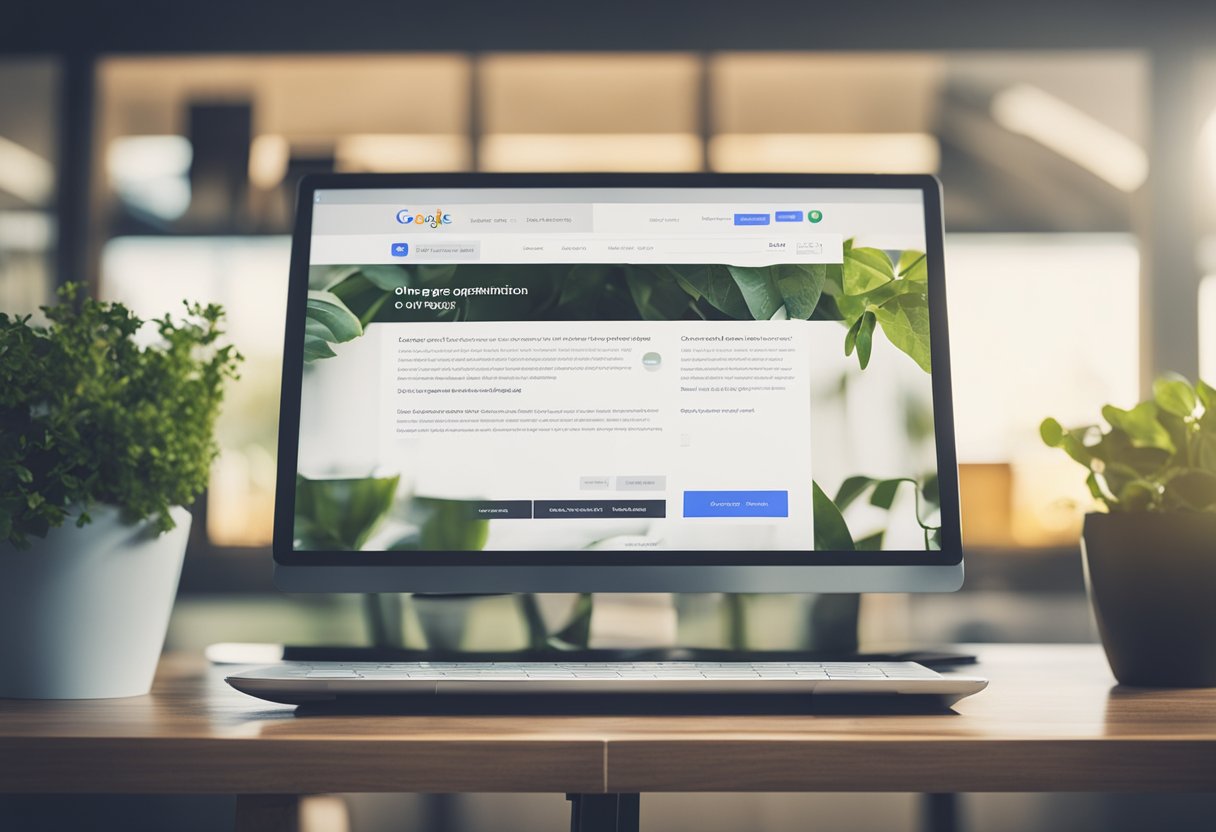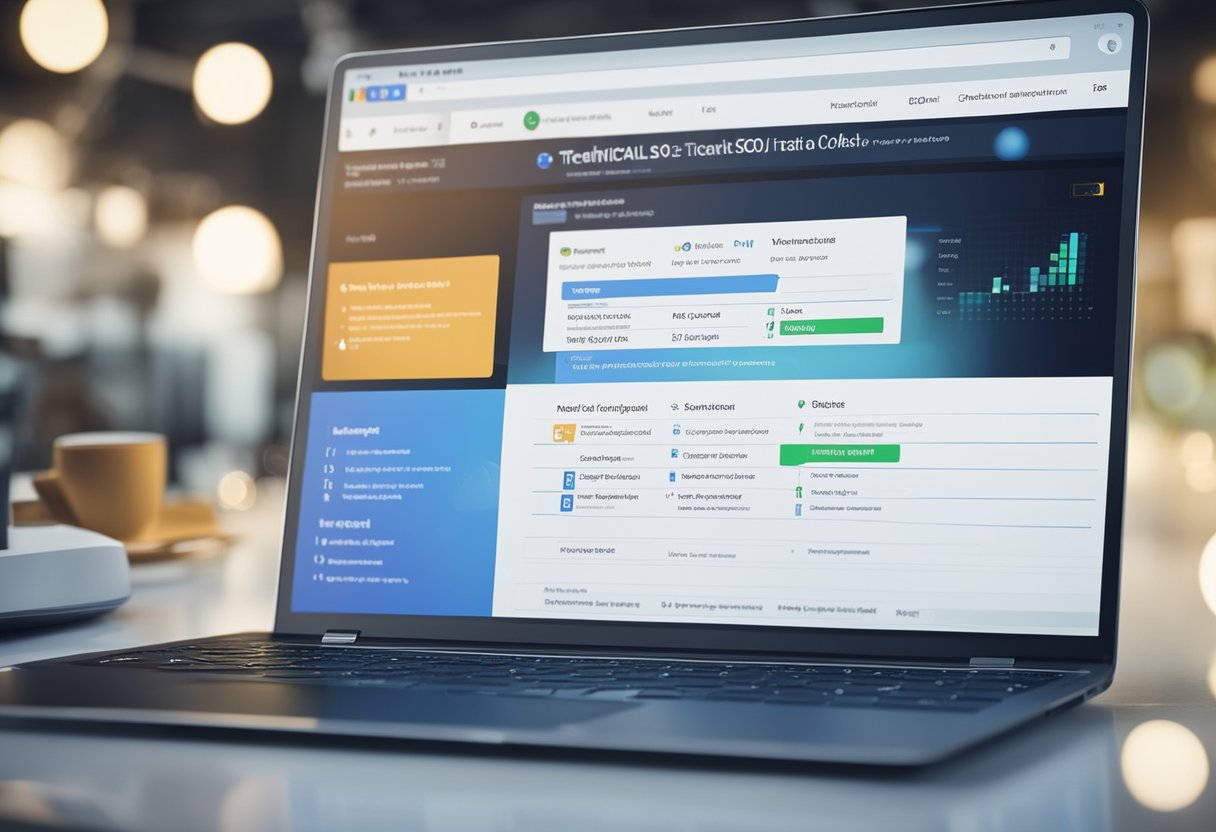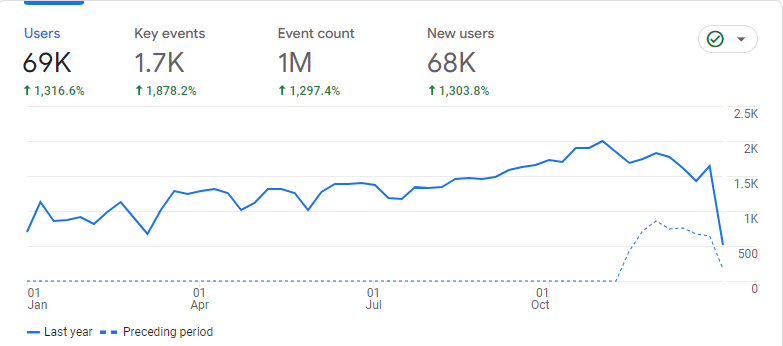#1 way to rank website fast on Google is the holy grail for many website owners and content creators. Unlike paid advertising, ranking organically on search engines offers credibility and can drive a significant amount of traffic to your site.
However, ascending to the first page of Google requires a deep understanding of SEO tactics, a commitment to creating high-quality content, and the flexibility to adapt to the ever-changing algorithms.

To accelerate your journey to the top of Google's SERP (Search Engine Results Pages), you need to hone in on effective keyword research, ensuring that you target terms and queries that are relevant and attainable for your website's niche. In tandem with keyword selection, optimizing each page on your site for these terms is crucial.
This includes incorporating the keywords naturally into your metadata, headers, and body content. Additionally, technical SEO elements should not be neglected, as site speed, mobile-friendliness, and secure connections are all factors that influence your rankings.
Key Takeaways
- High rankings on Google require a mixture of strong SEO practices and high-quality content.
- Proper keyword research and smart on-page optimizations are fundamental steps.
- A website's technical health and usability are critical to achieving and maintaining top SERP positions.
Understanding SEO Fundamentals

Achieving the number one spot on Google isn't just about building a website, it's about understanding how SEO works and applying key principles effectively.
How Search Engines Work
Search engines use complex algorithms to determine the relevance and authority of pages in their index. They crawl and index web content, then rank it based on factors like keyword relevance and backlink profiles. The goal is to return the most relevant and useful results to searchers.
- Crawling: Search engines use bots to discover new and updated content, following links and sitemaps to find pages.
- Indexing: Pages that have been crawled are analyzed and stored in a giant database from which they can be retrieved.
- Ranking: When you perform a search, the search engine sorts the indexed content by relevance and quality to answer your query.
It's important to understand that these processes are automated and influenced by the structure and quality of your website content.
Key SEO Principles
Good SEO practices rely on understanding what search engines value. Optimizing your site involves several core principles:
- Relevance: Use relevant keywords in your title tags, headings, and throughout your website's content to match the user's search intent.
- Quality Content: Produce well-researched and informative content that adds value to your audience.
- Site Architecture: Ensure your website has a clear structure with a well-organized sitemap, as this facilitates search engine crawling.
- Page Speed: Improve user experience by optimizing your website to load quickly on all devices.
- Mobile-Friendly: With mobile searches increasingly dominating, your site must be responsive and mobile-friendly.
- Backlinks: Cultivate quality backlinks from reputable and relevant websites to boost your site's authority.
By focusing on these principles, you can create a strong foundation for your website to achieve better rankings in search engine results pages (SERPs).
Keyword Research and Selection

To achieve a top rank on Google, you must embark on precise keyword research and selection. This is the cornerstone of SEO that aligns your content with user search queries.
Identifying Target Keywords
Begin by listing keywords central to your business and content. Tools like Google's Keyword Planner assist in identifying phrases your audience is searching for. Look for a mix of head terms (short, generic keywords) and long-tail keywords (longer, more specific phrases) that pertain to your niche.
Keyword Relevance
Ensure the keywords you pursue are highly relevant to your content. Your aim is to choose keywords that reflect the intent behind the search queries. For example, if you're selling eco-friendly water bottles, keywords like “sustainable water bottle options” may align well with what your potential customers are looking for.
Keyword Difficulty
Assess keyword difficulty to gauge your chances of ranking. Select keywords with an achievable level of competition for your site. The SERP landscape provides insight into what you're up against. Strive for a balance where the keyword difficulty is not too high to overshadow your chances but retains enough search volume to drive traffic.
On-Page Optimization Strategies

To secure top rankings on Google, you must leverage on-page optimization strategies effectively. Here's how you can begin to build a strong on-page SEO foundation.
Content Creation
High-quality, original content is crucial. Your content needs to be in-depth, and it should comprehensively answer the searcher's query. Aim for a clear structure with headings and subheadings to break up text and incorporate relevant keywords naturally without overstuffing.
Meta Tags Optimization
Optimize your title tags to reflect your main keywords and make sure they're under 60 characters to display properly in search results. Your meta descriptions should be compelling, within 160 characters, and include target keywords to improve click-through rates.
URL Structure
Your URLs must be clean and concise, typically including your target keyword. Ensure that they're intuitive and reflect your site's hierarchy. This makes it easier for both users and search engines to understand the content of the page. Use hyphens to separate words in your URL for better readability.
Technical SEO Checklist

When aiming to rank on the first page of Google quickly, addressing technical SEO aspects is crucial. Ensuring your website performs well technically will lay the foundation for your overall SEO strategy.
Site Speed Optimization
- Evaluate your site speed: Use tools like Google's PageSpeed Insights to determine where you can make improvements.
- Optimize images: Ensure your images are compressed to decrease loading times without sacrificing quality.
- Minify code: Reduce the size of CSS, JavaScript, and HTML files by minifying them, which involves removing unnecessary characters.
- Leverage browser caching: Set up caching rules to help return visitors experience faster loading times by storing some data locally in their browsers.
Mobile-Friendly Website
- Responsive design: Your site should automatically adjust to fit the screen it's being viewed on, whether it's a desktop, tablet, or smartphone.
- Avoid Flash: Use HTML5 instead of Flash as it's not supported on most mobile devices and can hinder mobile usability.
- Viewport configuration: Ensure your pages use the meta viewport tag, which controls the page's dimensions and scaling on mobile devices.
- Font sizes and touch elements: Choose font sizes that read well on small screens and ensure that all buttons and navigational elements are touch-friendly.
Secure Sockets Layer (SSL)
- Implement SSL: Ensure that your website uses SSL to encrypt data transmitted between the web server and the user's browser, indicated by HTTPS in your site's URL.
- Redirects: Set up proper 301 redirects from HTTP to HTTPS versions of your site pages to maintain search rankings.
- Secure all subdomains: SSL should be applied not just to your main domain but to all subdomains to ensure comprehensive security.
Content Is King

In a digital landscape where competition is fierce, the caliber of your content can make or break your chance to rank on the first page of Google quickly.
Creating Valuable Content
Your content must provide tangible value to your audience. This means conducting thorough keyword research to discover what your audience is searching for and crafting content that directly answers those queries. According to Search Engine Journal, Google doesn't solely prioritize the freshness of content; the substance and relevance are crucial. An effective strategy is to address common questions and pain points with comprehensive, well-researched, and actionable information.
- Identify long-tail keywords relevant to your niche.
- Answer the query comprehensively but concisely.
- Use authentic data and examples to back your claims.
Content Freshness
While older content can maintain rankings, regularly updating your site with new, relevant content can benefit your SEO efforts. As per the insights gathered from Rock Content, fresh content can signal to Google that your website is current and continues to be a valuable resource. If you're covering topics that are time-sensitive, like news or trends, the freshness of your content is significantly more impactful.
- Update existing content with the latest information and statistics.
- Post new content consistently to keep your site active.
- Monitor trending topics within your industry to produce timely content.
Building Quality Backlinks

Building quality backlinks is pivotal for ranking your website on the first page of Google quickly. It requires strategic planning and execution, focusing on the relevance and authority of your link sources.
Link Building Techniques
You can employ several effective link building techniques to enhance your website's visibility:
- Guest Posting: Offer valuable content to reputable websites and include a link back to your site.
- Broken Link Building: Identify broken links on high-authority sites and suggest replacing them with your relevant content.
- Skyscraper Technique: Improve upon existing high-ranking content and reach out to the original backlink sources.
Anchor Text Diversity
Your link profile must include a variety of anchor texts to appear natural to search engines:
- Exact-Match: Anchor text that matches the keyword for which you're trying to rank.
- Partial-Match: Anchor text that includes a variation of your target keyword.
- Branded: Anchor text that uses your brand name.
- Generic: Non-targeted words like “click here” or “read more”.
Ensure your anchor text is contextually relevant and avoid over-optimization, which can be penalized by Google.
User Experience and Usability

User experience (UX) and usability directly influence your site's ability to rank prominently on Google. When these are optimized, you increase the likelihood of achieving a high ranking fast.
Navigation and Structure
Your website's navigation should be intuitive and logical. Users need to find information quickly and easily to avoid frustration and bounce-backs. A well-organized site with a clear hierarchy in the menu can improve crawlability for search engines, thus enhancing visibility. Ensure you have a sitemap and employ breadcrumb navigation to aid both users and search engines in understanding your site's structure.
User Engagement Metrics
User engagement metrics like bounce rate, dwell time, and click-through rate are indirect indicators of your website's relevance and value to visitors, which can affect your ranking. Pages with low bounce rates and longer dwell times are seen as offering valuable content, encouraging Google to rank them favorably. Aim to increase engagement by providing relevant, high-quality information and incorporating internal linking to guide users to related content, keeping them on your site for longer.
Local SEO for Small Businesses

Optimizing for local SEO is crucial for small businesses seeking visibility in search engine results, especially when targeting the local community as your primary audience.
Google My Business Optimization
To increase your chances of appearing on Google's coveted local pack, ensure your Google My Business (GMB) profile is thoroughly completed and accurate. Regularly update your profile with correct contact details, operating hours, and high-quality images. Encourage satisfied customers to leave reviews, as positive ratings can boost your local visibility.
Local Citations
Building local citations from well-regarded business directories can also drive your local SEO efforts. Ensure your business's name, address, and phone number (NAP) are consistent across platforms. Citations from industry-relevant sites like Yelp or your local chamber of commerce, validate your business's legitimacy to search engines.
Leveraging Social Media

In today's digital age, social media is a powerful tool to boost your online presence and improve your rankings on search engines like Google.
Social Signals and SEO
Social signals refer to the likes, shares, comments, and overall online visibility of your content within social media platforms. Although social signals are not a direct ranking factor for Google's algorithm, they can indirectly influence your SEO. For instance, social media SEO strategies can help your local business listing rank higher in Google Maps. Furthermore, a page that garners a high amount of interaction in the form of likes and shares is likely to increase its visibility and may lead to more backlink opportunities, which are critical for SEO.
Content Promotion
Promoting your content on social media channels is essential for driving traffic back to your site and enhancing your visibility. It's important to create valuable content that resonates with your audience and encourages engagement. By doing so, you'll increase the chances that your followers will share your content, thus extending its reach. It's worth noting that platforms such as LinkedIn can be leveraged to get your page to rank higher, especially when the content shared is insightful and appeals to a professional audience. Engage with your audience and encourage social sharing to maximize the SEO benefits of your social media efforts.
Monitoring and Analytics
When aiming to rank your website on Google, having a comprehensive grasp of monitoring and analytics is essential for evaluating your SEO strategy's effectiveness. This insight helps you refine your tactics and maintain a clear vision towards your ranking goals.
SEO Tools and Software
In the toolkit of a successful SEO campaign, SEO tools and software play a pivotal role. With tools like Google PageSpeed Insights, you can analyze your website's performance and loading speed, which are critical factors for ranking. To stay on top of your site's SEO health, consider leveraging comprehensive platforms. These can help you track keyword positions, audit your site for on-page SEO issues, and provide competitor analysis to gauge where you stand in your industry landscape.
Measuring SEO Success
Measuring SEO success is not about checking off boxes; it's about understanding data trends and user engagement. Key performance indicators (KPIs) such as organic traffic, bounce rate, and conversion rate are fundamental metrics to track. Tools that integrate with Google Analytics give you a detailed overview of how well your content resonates with your audience. Remember, a top-ranking position on Google correlates strongly with increased visibility and potential lead generation, so tracking these metrics offers clear insight into your SEO ROI.
Frequently Asked Questions
To achieve a coveted spot on Google's first search results page, you'll need to master search engine optimization (SEO) strategies. This section helps address common queries related to on-page SEO and ranking improvements.
What are the top on-page SEO factors that affect Google rankings?
Your Google ranking is significantly influenced by on-page elements such as quality content tailored to user intent, mobile-friendliness, page speed, and keyword optimization. Ensuring that your page aligns with what users are searching for boosts your chances of ranking higher. Read more about aligning with user intent on LinkedIn.
How can a website improve its Google ranking organically and without cost?
Improving your Google ranking organically involves optimizing your website content for search engines, using relevant keywords, and creating informative, high-quality content. Regular updates, proper page indexing, and acquiring backlinks from reputable sites can also elevate your rankings at no additional cost.
What strategies can businesses employ to feature prominently on Google's first search results page?
Businesses can craft SEO-friendly title tags, utilize meta descriptions effectively, and employ schema markup to enhance visibility. Incorporating FAQs into your content is also an excellent strategy to appear in rich search results. Get insights into optimizing FAQ blocks for SEO on YouTube.
What is a realistic time frame for a website to achieve a first-page ranking on Google?
The time frame to reach the first page of Google can vary widely, from a few months to over a year, depending on competition, keyword difficulty, and the current state of your website's SEO. Consistent optimization and content building are crucial for quicker results.
How does appearing on the first page of Google search results benefit a business?
Appearing on the first page enhances visibility, increases website traffic, reinforces business credibility, and can significantly boost conversion rates. High rankings are a signal to users that your website is a relevant and trustworthy source.
What free tools are available to check and monitor Google ranking positions?
Free tools such as Google Analytics, Google Search Console, and other third-party SEO tools offer insights into your ranking positions, website performance, and opportunities for improvement. Using these tools effectively can help you elevate your ranking.
You Might Be Interested In These Too!
 Vizard AI: Video Editing & Social Media Made Easy for Content CreatorsFebruary 8, 2024
Vizard AI: Video Editing & Social Media Made Easy for Content CreatorsFebruary 8, 2024 Grow Your Travel Agency Business With 5 Digital Marketing PlansDecember 23, 2022
Grow Your Travel Agency Business With 5 Digital Marketing PlansDecember 23, 2022 Perfect Website Domain Name: 10 Best Step To Choose ItAugust 8, 2022
Perfect Website Domain Name: 10 Best Step To Choose ItAugust 8, 2022 Established Your Travel Agency Brand: 5 Social Media IdeasDecember 18, 2022
Established Your Travel Agency Brand: 5 Social Media IdeasDecember 18, 2022







